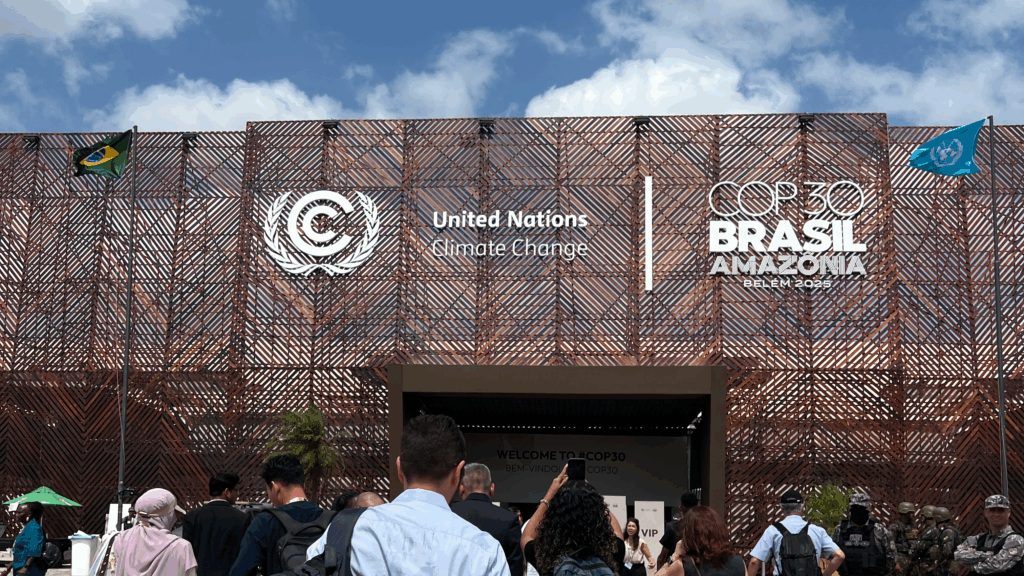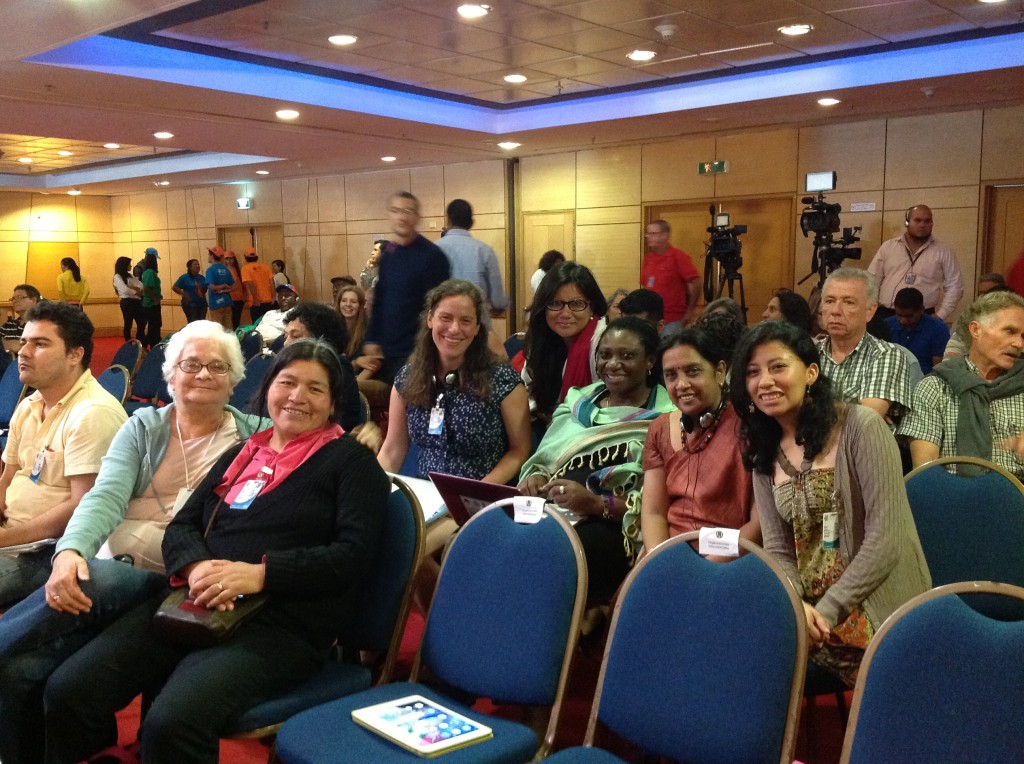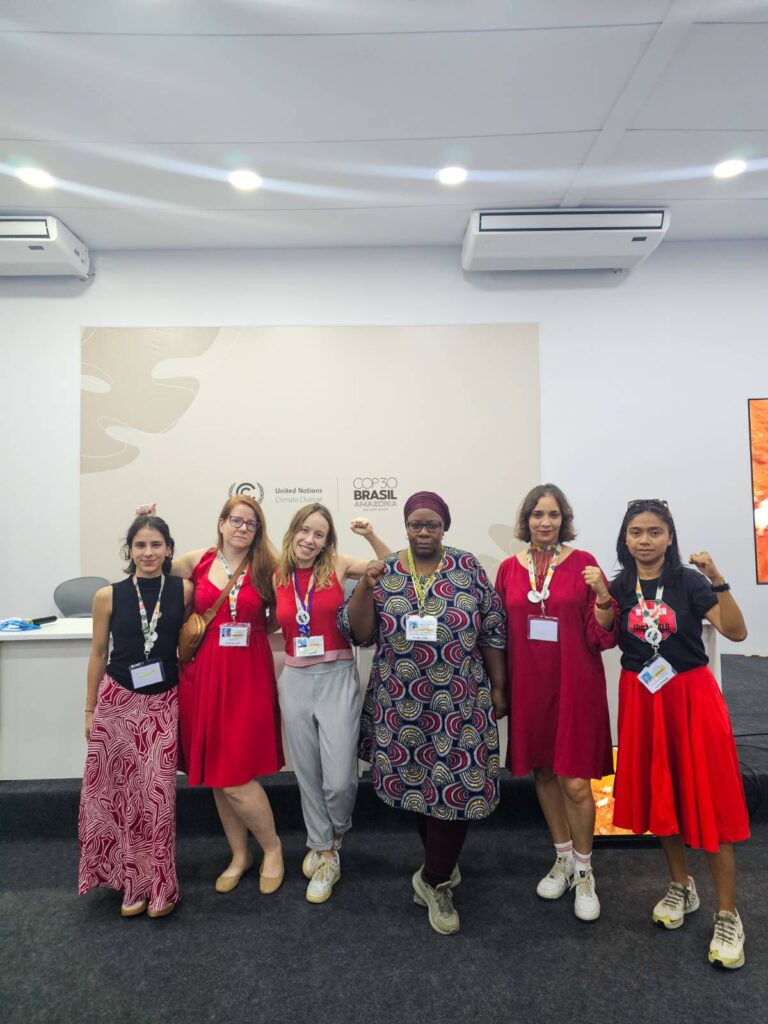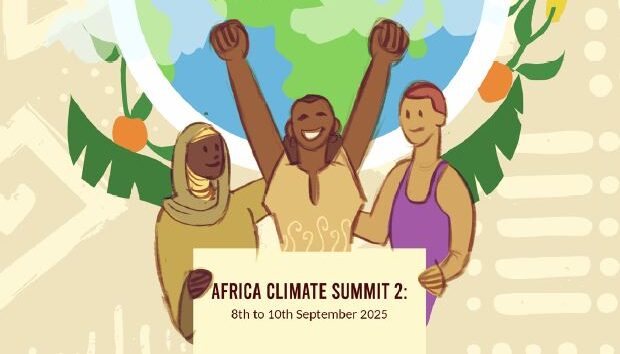
Women’s Social PreCOP Statement “Women want system change, not climate change”
From 15-18 June 2014, representatives of the Women and Gender Constituency attended the Preparatory Meeting of the Social PreCOP on Climate Change, organized by the Government of Venezuela on Margarita Island, Venezuela.

Women’s Social PreCOP Statement “Women want system change, not climate change”

- Women want system change, not climate change
- Climate justice is gender justice
- Women’s human rights require more than non-discrimination and participation
- Gender-sensitive and gender-responsive policy making
- Just and gender-equitable transitions
- False solutions to climate change violate women’s human rights
- Participation must mean decision-making
- An expansive and gendered approach to loss and damage
As part of the negotiations of the UN Framework Convention on Climate Change, the Social PreCOP on Climate Change aims to channel the fair inclusion of social voices so that the proposals and demands of popular movements and organizations are heard when drafting the new global agreement on climate change to replace the Kyoto Protocol, whose adoption scheduled for 2015 will coincide with the agreement on the future of the Millennium Development Goals (MDGs) and the birth of the Sustainable Development Goals (SDGs).
To add the critical perspectives of women’s human rights / feminist/ social justice organizations and alliances, the representatives of the Women and Gender Constituency have drafted a Statement for consideration into the Social PreCOP process.
Women want system change, not climate change
Representatives of the Women and Gender Constituency gathered in Margarita Island, Venezuela, and colleagues back home endorse the call for ‘system change, not climate change’ – an urgent, radical transformation of economic, environmental, social, political and cultural systems to sustain life on the planet, and to fulfill women’s fundamental human rights. Our future on this Earth depends on our capacity to develop new, more just and equitable ways of living.
We call for a new model of sustainable development that delivers more equitable distribution of power, resources, energy, wealth and opportunities between countries, between rich and poor and between men and women. Our current extractive economic model cannot deliver a just and sustainable future for all. A new model of Development Justice[1] that secures human rights for all, peace, equality and ‘BuenVivir’[2] for all people and our planet is imperative.
To guarantee the inherent sustainability of the planet is a pre-requisite for the full enjoyment of women’s human rights. Climate change and unsustainable living exacerbates and re-produces existing gender inequalities with dire results for women.
Climate justice is gender justice
We acknowledge that women and peoples, particularly of the Global South, suffer most from environmental destruction and unsustainable consumption and production, yet they have contributed the least to global warming and degradation of the planet. Though all of humanity would benefit from this transformation, women and peoples of the South have most to gain from the system transformation and we acknowledge they are also central to the needed transformation. Gender differences make women more vulnerable during and following disasters. The mortality rates for women are higher than those of men in almost all climate related disasters[3], they comprise the majority of the world’s poor and are more dependent on natural resources for their livelihoods. They are less likely to have access to energy, form the majority of subsistence farmers, yet are more likely to till marginal lands and face insecurity of tenure. Women who are charged with the responsibility to secure water, food and fuel for cooking and heating face the greatest challenges. They are most vulnerable to land degradation, land-grabbing and the aggressive practices of states and corporations to privatize common land and resources. When women lose control and access over productive land and resources they are more likely to take on informal, low-paid, exploitative work and migrate into vulnerable employment and be exposed to trafficking.
We endorse the need for a binding, ambitious agreement that necessitates immediate, transformative action. We endorse the Rio principles, including Common but Differentiated Responsibilities and Respective Capabilities (CBDR RC) and encourage civil society and governments to consider also the common but differentiated responsibilities between communities, specifically between rich and poor and between men and women, without diminishing the obligations and historical responsibilities of polluting, wealthy states.
Women’s human rights require more than non-discrimination and participation
Non-discrimination and substantive equality are central to the full realization of women’s human rights. We welcome the recognition that gender equality must be a guiding principle as well as a crucial cross cutting element in all climate policies and actions.
However, we are concerned about the growing tendency of governments to express commitments to gender equality and women’s empowerment without any corresponding commitments to address the structural causes of rights violations or to provide the means of implementation. Equality and non-discrimination are elements, not the entirety, of the human rights promised to women through the Universal Declaration of Human Rights and all consequent commitments.
Inequalities are reproduced by neo-liberal, extractive economic models, and the global political, patriarchal and military systems designed to protect it. Demands for gender justice should not be appropriated purely to advance liberal individualism.
As women’s human rights and sustainability advocates we do not aspire to women becoming only 50% of those living in poverty, displaced or killed. Nor do we aspire to women being equally represented in the 1%, or having the equal right to exploit other women. Instead we assert that human rights are also women’s rights and women’s human rights cannot be delivered in an unjust and unsustainable world.
Gender-sensitive and gender-responsive policy making
Gender-sensitive tools and approaches to climate action are crucial to ensuring solutions both to reduce emissions and respond to the real needs & rights of women and men. Viewing climate policy through a gender lens leads to questions of access, rights, and resources which, when properly addressed, can ensure policies encompass the various social dimensions of climate impacts and actions, both intensifying their effective implementation and working towards sustainable development, poverty eradication, health and good governance. This is crucial across all areas of climate policy, from mitigation and adaptation to means of implementation.
In particular, climate and development policy making must address the differentiated loss and damage as well as the differentiated adaptation responses required by women and men. Women’s knowledge and perspectives, particularly local and indigenous knowledge and traditional practices, should be reflected in programmes and policy processes and valued as important expertise for adaptation, for sustainable living, and to address the inter-generational and life-cycle loss and damage caused by environmental degradation.
However, policies must ensure that this knowledge of traditional practices is garnered through meaningful, non-proprietary and inclusive participation of women, in particular to indigenous and local women at all levels of planning, implementation and monitoring and decision-making.
Just and gender-equitable transitions
The imperative to transition to new development and economic models provides an opportunity to re-think economies and to create more just, equitable, gender-sensitive and localized economies that deliver decent work for all and equitable distribution of resources, time and power.
This transition should crucially challenge the gendered-division of labor, which places women in often low waged, insecure and informal subsistence and service industries, and in particular, aim to reduce and redistribute unpaid care and domestic work, the burden of which is an obstacle for women’s ability to fully exercise their rights, due to excessive time and energy use. This is a macroeconomic and structural agenda that affects developed and developing countries, deepening inequalities.
New sustainable economies should focus on increasing non-work time, growth of community, expansion of the commons and enhanced democratic engagement, rather than the growth of consumption, production and profit.
As just transitions for decent work are prioritized, we must recognize that the most sustainable and low emissions employment is often dominated by women including subsistence farming, service industries, domestic and care work. Transitioning these fields to secure Decent Work standards and conditions is essential for new, sustainable and just economies.
False solutions to climate change violate women’s human rights
The commodification of the environment is a false solution that can exacerbate inequalities and cause rights violations. Often, market-based approaches, including REDD and REDD+, and many public-private partnerships, do not address the fundamental need to reduce consumption and production in high emitting countries. Protection and preservation of Mother Earth must be the prime concern and objective of all policies.
We maintain that high-risk technologies that create irreversible damage to our health and the environment, such as nuclear, shale gas, geo‐engineering, fracking or the like are not acceptable. They must be kept out of a 2015 agreement, which should instead focus on bottom-up approaches that benefit people and communities, respect rights, enhance resilience, reduce current and future emissions and facilitate the genuine transformation that is a requirement for truly sustainable development and climate protection.
We are deeply concerned about the influence of the corporate sector on climate negotiations. Primary focus of climate negotiations must not be growth or profit but must be the rights and aspirations of people, particularly those at the frontlines of climate impacts– most often women of the global south.
The increasing promotion of public-private partnerships and enhancing the role of the private sector in sustainable development obscures the fact that private companies are not obligated to invest in social needs and public good, but are obliged to protect share-holder interests. It also obscures the complicity of the private sector, particularly large trans-national corporations, in promoting unsustainable models driving catastrophic climate change. Regulation that ensures accountability and transparency of non-state actors, particularly trans-national corporations and public-private partnerships, is critical for achieving sustainable development.
Participation must mean decision-making
A sustainable planet will only be possible through a shift to community led economies driving equitable climate solutions. Bottom-up approaches, using proven small-scale, ecologically sound initiatives that genuinely deliver “co-benefits” must be central. To do this women must be equal decision makers in all governance and development decision making – starting with decision making over their own bodies, their homes, their commons, their communities and in national, regional and international policy setting.
Safeguards that guarantee free, prior and informed decision making through transparent, equitable and accountable development governance is critical for women and sustainable communities.
Decision making led by local communities must be accompanied by reforms in global governance. While the UN may not be perfect and needs democratic reforms, it is currently the best vehicle for global governance over all related development matters, including financing, trade and regulation.
An expansive and gendered approach to loss and damage
Loss and damage caused by climate change is felt most acutely by women. The damage they experience is often life-long, even intergenerational and includes damage to culture, safety, community, knowledge, health, time and the ecologies they depend on. Loss and damage experienced by women cannot be measured in simple asset or GDP loss. Loss and damage definitions must be expansive and recognize the gendered nature of loss and damage. Efforts to improve risk assessments and management, data collection and community knowledge, decision making and involvement must all be conducted with full involvement of women and their movements.
We call on all our governments to foster the political will and courage required to secure the future viability of the planet for all human beings. Every delay, every attempt to obfuscate responsibility and every attempt to dilute commitments will result in increased death and suffering of the world’s people who suffer most vulnerability – women and children, especially of the global South. We can, and must consider these actions as crimes against humanity.
We affirm that the extractive model of development is not a solution and that we must work intentionally to create solutions that care for the planet and for life in the planet.
—————————————————————————————
[1] ‘Development Justice is a concept articulated initially by more than 100 civil society organizations in Asia Pacific through the Bangkok Declaration 2013 and since adopted by a range of movements. It calls for five transformative shifts to deliver Development Justice: Redistributive Justice, Economic Justice, Gender and Social Justice, Environmental Justice and Accountability to the Peoples.
[2] Buen Vivir are the practices that result on harmonious living with one self, others and the planet. It is not about better living, but the well being of humans and the planet.
[3]61% were women killed in Cyclone Nargis, Myanmar 2008; 67% in the 2004 Indian Ocean Tsunami; and 91% in Bangladesh during cyclone Gorky in 1991. ASEAN, GOM & UN 2008, Doocy and Rofi (John Hopkins and Mercy Corp) 2006, IFRC 2006.

